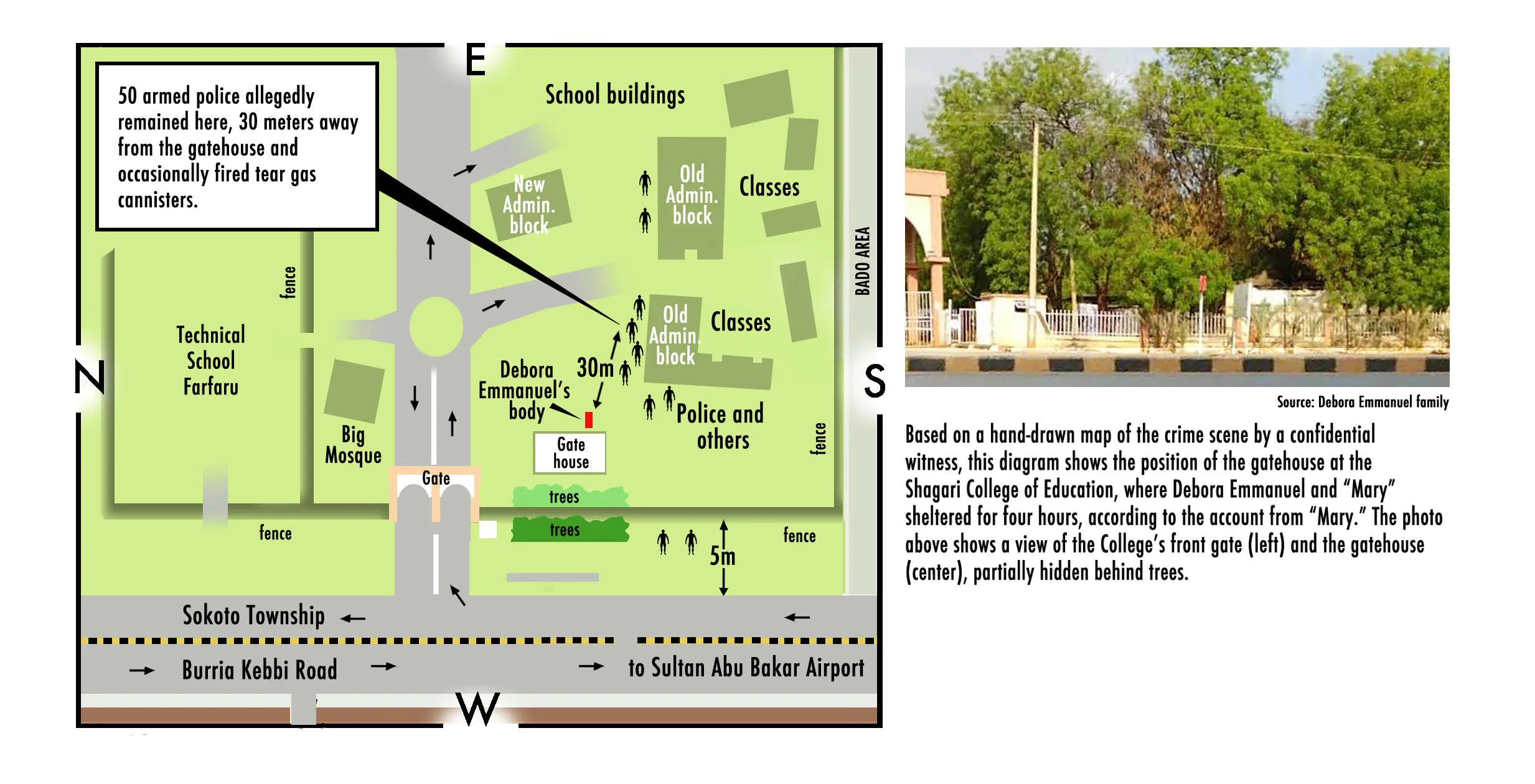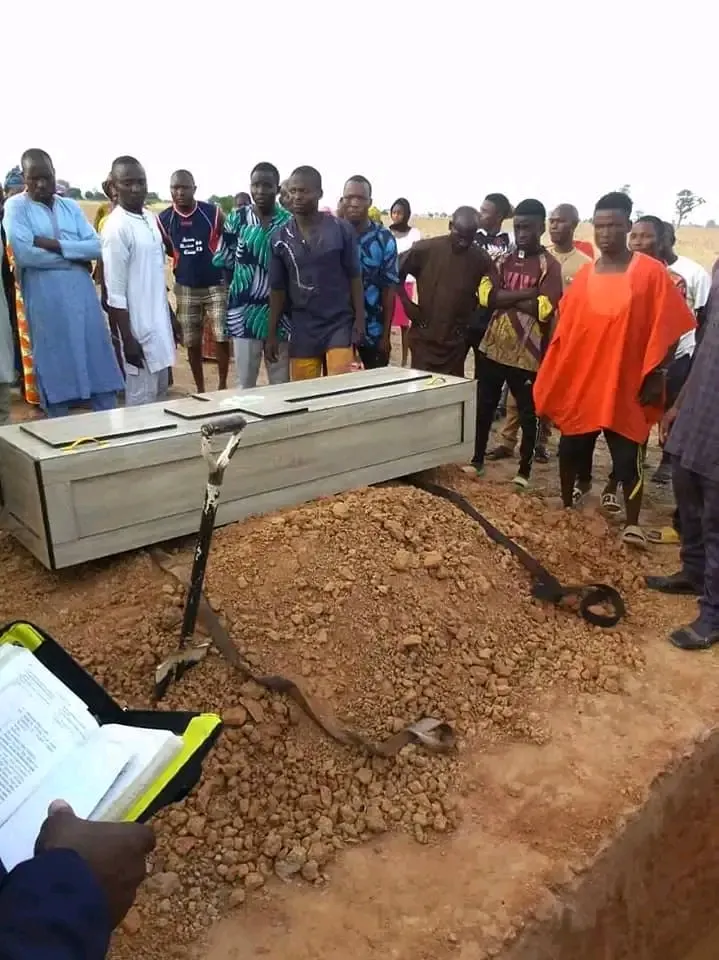Des heures durant, on a hurlé "Allahu Akbar !", ce qui signifie "Dieu est grand", dit-elle.
Mary est d'abord restée à l'extérieur du bâtiment et a essayé d'intercéder pour son ami, mais elle a dit que la foule n'a pas tardé à se retourner contre elle aussi. En quelques instants, Mary a essayé d'éviter les coups de poing et les coups de bâton alors qu'elle s'éloignait de la guérite et se dirigeait vers la porte de l'université située à 40 pieds de là.
Mary a déclaré qu'un professeur de l'université l'avait secourue et amenée à rejoindre Emmanuel à l'intérieur de la guérite à 10 heures.
A 10h25, selon le parent, six officiers du Département de la Sécurité d'Etat (DSS) - l'équivalent du FBI aux Etats-Unis - sont arrivés, tirant en l'air avec leurs fusils mais sans effet. Cinq minutes plus tard, dit-il, un groupe de policiers de Sokoto est arrivé sur les lieux et a tiré des gaz lacrymogènes, dispersant temporairement la foule.

Pendant une dizaine de minutes, la police a eu l'occasion de disperser la foule et de se frayer un chemin jusqu'à la guérite pour extraire Mary et Emmanuel, croit le parent de ce dernier. Mais cela ne s'est pas produit.
Abonnez-vous à notre newsletter quotidienne
Utilisez le formulaire ci-dessous pour nous indiquer où nous pouvons envoyer les dernières actualités d'ACI Afrique.
A 11 heures, la foule est retournée dans le bâtiment, tenant des chiffons sur leur visage pour éviter les gaz lacrymogènes. La foule a essayé de lancer des pierres sur Mary à travers les fenêtres de la guérite fermée, mais Mary s'est barricadée derrière une table.
La foule a ensuite jeté de l'essence sur les femmes par les fenêtres de la façade et a tenté de les brûler vives, selon Mary.
“Deborah was soaked with gasoline, but when lighted plastic was pitched in through the windows, I quickly stamped the flames out,” Mary said.
No escape
All of this transpired as police and DSS officers watched from a safe distance, according to Emmanuel’s relative.
The traumatized women said little to each other, but Emmanuel was still hoping to do her examination that day, Mary said. At one point, she recalled, Emmanuel asked, “What time is it? I have an examination at noon.” Mary said she looked at her cell phone and told her it was 1 p.m.
After another excruciating hour of siege, the mob pushed down a single Sokoto policeman guarding the door, broke the padlock on the door, and rushed in to find Mary and Emmanuel hiding behind furniture, Mary and the relative related. Two rioters placed a chain around Mary’s neck and pulled it hard, trying to strangle her, she recounted.
“Let this girl go! She is not an offender,” Mary recalled one of the rioters shouting. But as they released her, a young man in the mob grabbed Emmanuel and took her to the front steps of the gatehouse. There she was bludgeoned with steel pipes and wooden rods and stoned, the relative said.
Two DSS officers attempted to rescue Emmanuel but were hit by stones and pushed aside, the relative said. The police officers remained in position and did not come to her aid, he alleged.
Mary collapsed inside the gatehouse gasping from the strangulation. Approximately 40 minutes later, she said, she was roused by one of the mob to leave the building, which was on fire.
As she walked through the smoke, Mary saw the gatehouse burning and Emmanuel’s lifeless body in flames.
The face of Christian persecution
In the aftermath of Emmanuel's murder, human rights advocates and others have leveled sharp criticism at Nigeria's government leaders for not doing enough to stem the rising tide of violence directed at Christians and other non-Muslims.

Anti-Christian hatred was evident in days of rioting in Sokoto following the arrest of two suspects in Emmanuel’s murder. The rioters reportedly were incensed that there were any arrests at all.
"Deborah Emmanuel, like kidnapping victim Leah Sharibu (who was enslaved by Boko Haram insurgents in 2019), has become the face of Christian persecution in Nigeria,” said Kyle Abts, executive director of the International Committee on Nigeria (ICON). “There has not been an official report from the security forces on the lynching of Ms. Emmanuel. Her killing and subsequent riots show clear government complicity and coverup.”
Tina Ramirez, founder of the international nonprofit Hardwired Global, also believes the Nigerian government has been unwilling to take a strong stand against blasphemy killings.
“The recent attacks on students are reminiscent of the attacks at Nigerian colleges two decades ago that were the precursor to the growth of extremist groups across Nigeria’s North and Middle Belt,” Ramirez wrote in a text to CNA.






